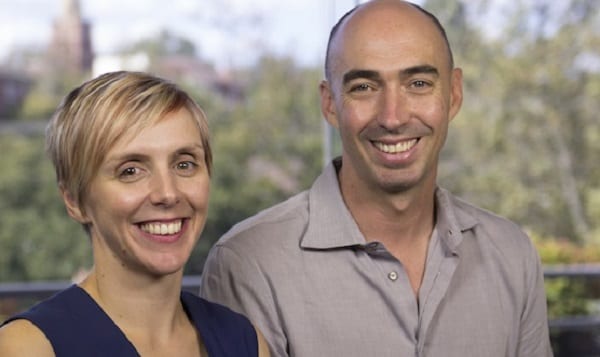After 37 years of making these choices, entrepreneurial power couple Roger and Lesley Gillespie are handing over the business to another husband-and-wife team.
The couple’s daughter, Elise, and her husband David Christie, have assumed joint chief-executive roles for the 700-strong bakery network.
The Bakers story is one of decades-long expansion, from a single shopfront to hundred million-dollar network. When Lesley Gillespie appeared on SmartCompany’s list of top female entrepreneurs this year, the estimated revenue of the business was $595 million.
While the incoming leaders have been exposed to the business for decades, the process of planning a leadership transition can be an emotional one, especially in a family business where the owners simply haven’t planned for it, says managing director of family business advisors FINH, David Harland.
“What family businesses don’t do is they don’t think about these things as a family – it’s all in the hands of the current leader,” he says.
While smooth transitions tend to happen when businesses have structured policies in place for business exit and the roles family members should play in the business, too often nobody thinks about these until it’s too late, Harland says.
“The notion of ownership transfer and stewardship is about the family sitting down and having some policies. Like, on what basis can the family member work in the business?”
And even when the transition is smooth, there’s still plenty of work to do. Elise Gillespie and David Christie say that despite decades of exposure to the business, they’re thinking in detail about leadership, complacency and the future.
A business based on teamwork
When it comes to leadership transitions, the skills of the individual leaders often come to the fore. For Gillespie, watching her parents build the Bakers network was a good lesson in balanced skill sets.
“My parents are a good complement of each other. Mum, she’s very passionate about developing young people and very detailed focused. Dad is more big picture and entrepreneurial,” she says.
While the new chief executives say they have a more even split in terms of their approach and interests in the business, they say their interest in working together as a couple is not dissimilar to many of their employees and franchisees — and this helps them to better communicate about the business.
“We have two children, and it’s when I’ve gone on maternity leave that it’s quite strange. Dave says, ‘I really missed you!’” Gillespie says.
“It would be hard to imagine not working together,” Christie says.
“It suits our business because a lot of our franchisees are couples and operate in a similar way. They manage their family and the franchises.”
Bakers Delight’s founding team put the focus on building relationships with communities and the franchise network, and Gillespie says this will be one of the most obvious elements of the business to sustain.
“We’re also wanting to attract 150 franchisees over the next few years. Bringing in new franchisees brings in fresh thinking as well,” Gillespie says.
Product excitement and “getting it wrong”
When you’re literally “only as good as your last loaf of bread” in the customers’ mind, the smallest decisions about baked goods have a direct impact on sales. It’s a lesson that is front of mind for Gillespie and Christie as they take the reigns of the business.
“When we make decisions on products and even around packaging, it’s so important,” Gillespie says.
“This year we launched our apple cinnamon hot cross buns, we’ve had one of the biggest seasons.”
The business sold 20 million hot cross bun units this year, up from 15 million in 2016.
Christie says over the years they’ve been lucky enough to also see products that haven’t worked, and that’s been just as important for future planning.
“You have to be prepared to get it wrong occasionally as well,” Christie says.
“About probably about 6 or 7 years ago we launched a pink tart. Basically, it didn’t taste good — that’s pretty important.
The couple reflect on the incident of the bright pink treat as a lesson in the importance of quality control for new ideas.
“We did the right thing, and pulled it pretty quickly.”
Lessons in risk
“It’s pretty daunting taking over a big business – but if we’re going to be successful, we’re going to have to take some risks,” Gillespie says.
Like many who come from families of entrepreneurs, the pair don’t recall any big lessons or speeches about business success from their parents.
That said, some messages ring clear from observing the business for decades — including the risks of complacency and the importance of communication.
“We are an international business, we operate in four countries, but Canada should equal Australia, definitely in the future it’s got the population; the KPIs for the way we track over there we’re matching in Australia in terms of key sales measures.
“It’s a gateway to a much bigger market in the US.”
While the continued strength of the Australian business is the priority, Christie says creating a spark in the product offering is important wherever they are.
“The main thing for us is just making sure that our offer is exciting — our offer to both customers and franchisees.”
And the pair say they won’t be afraid to ask for help in the process.
“For us, individually, we’ve always focused on our people, and it will be no different in these role. And we’ll be leaning on our executive team, even more than I think my parents did … we need their expertise,” Gillespie says.
This is an edited version of a piece that first appeared on SmartCompany’s, sign up to their free daily newsletter.


